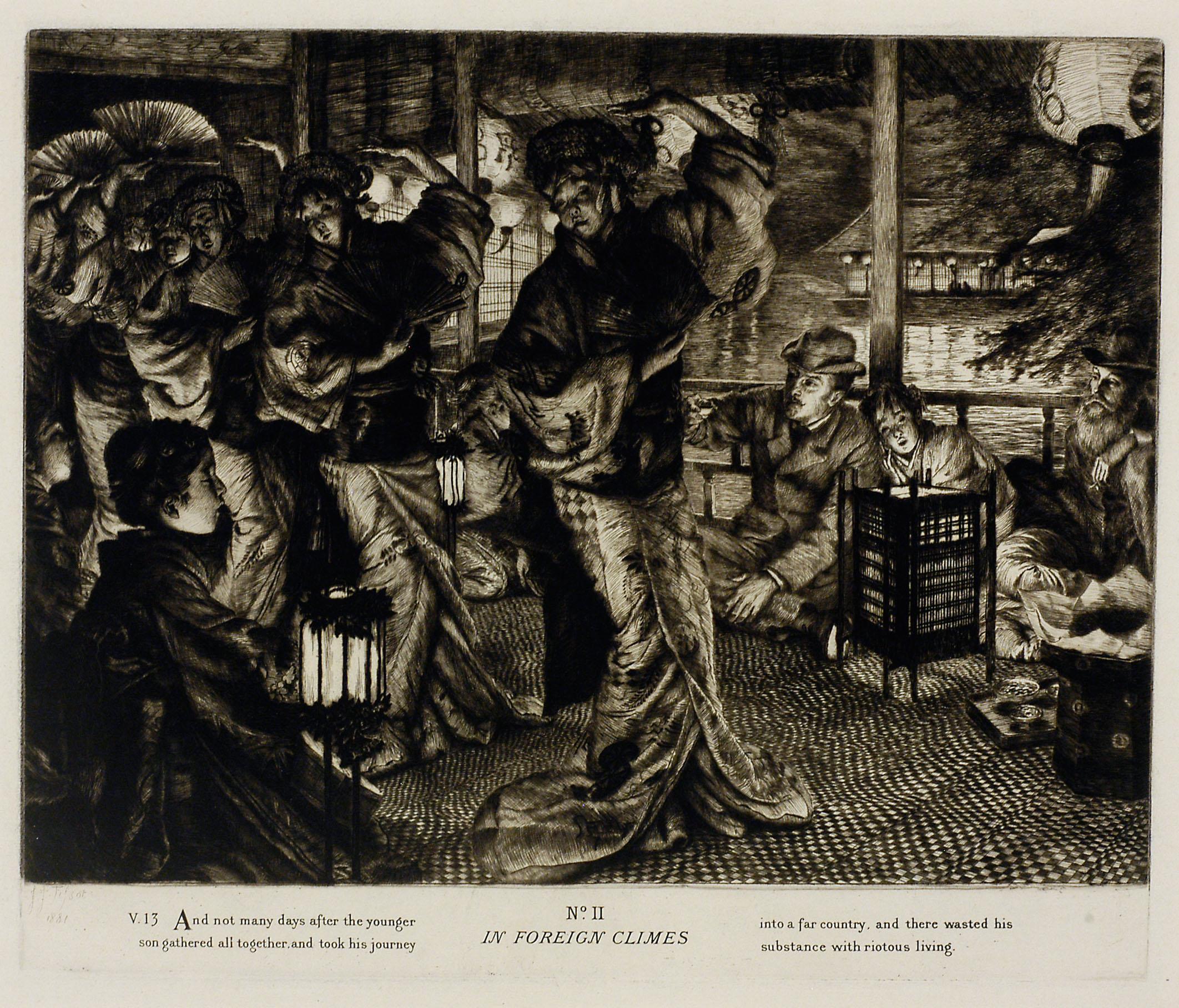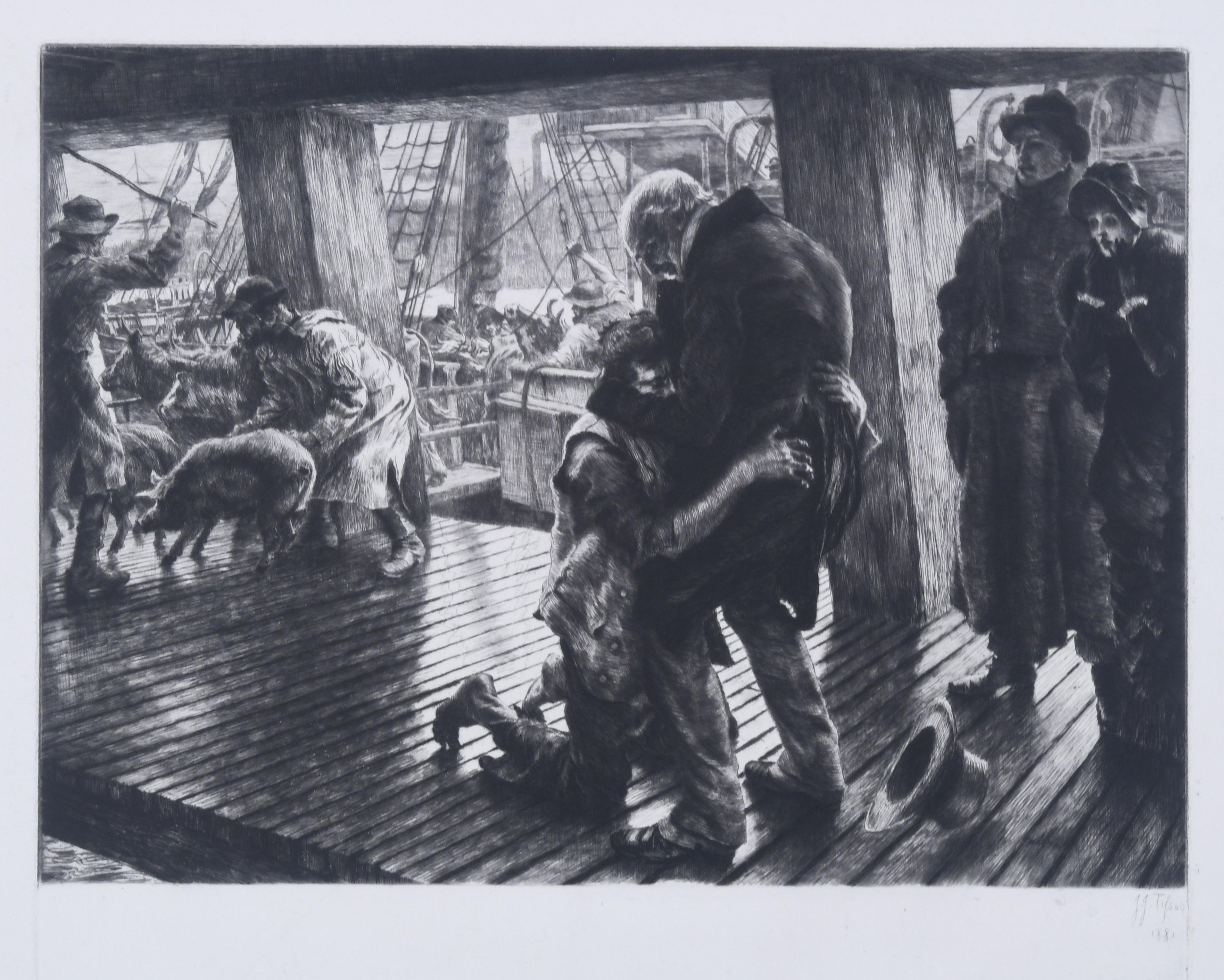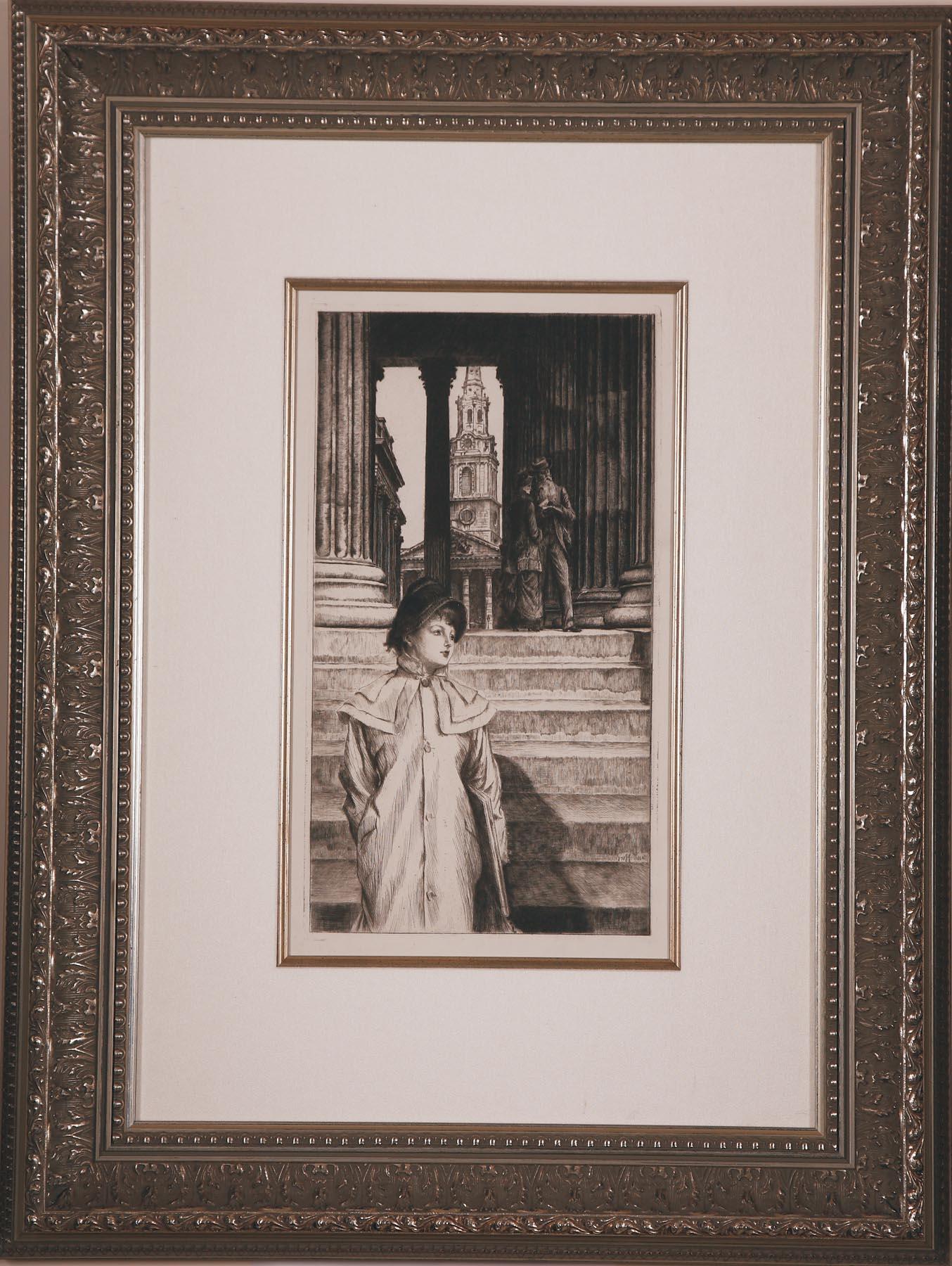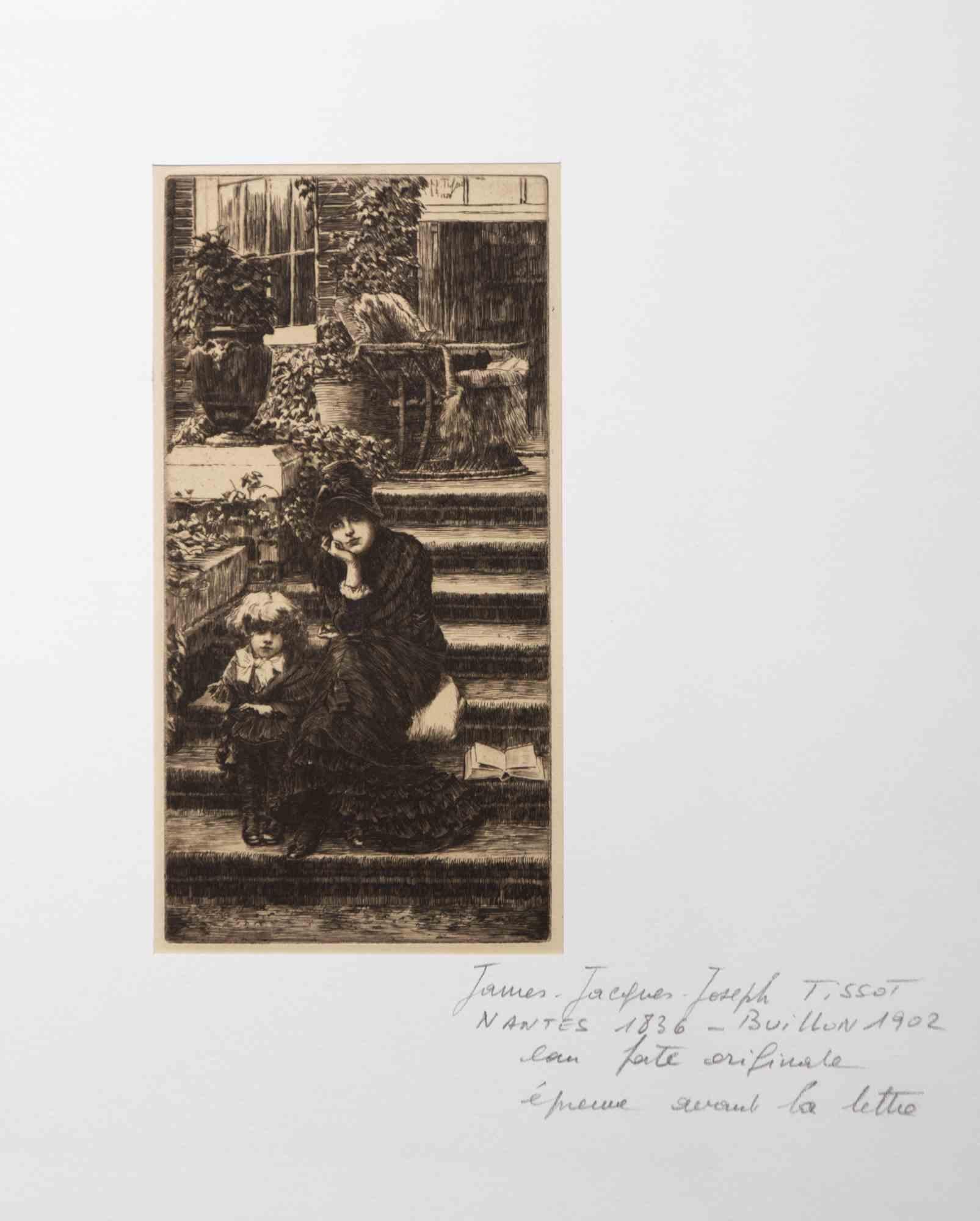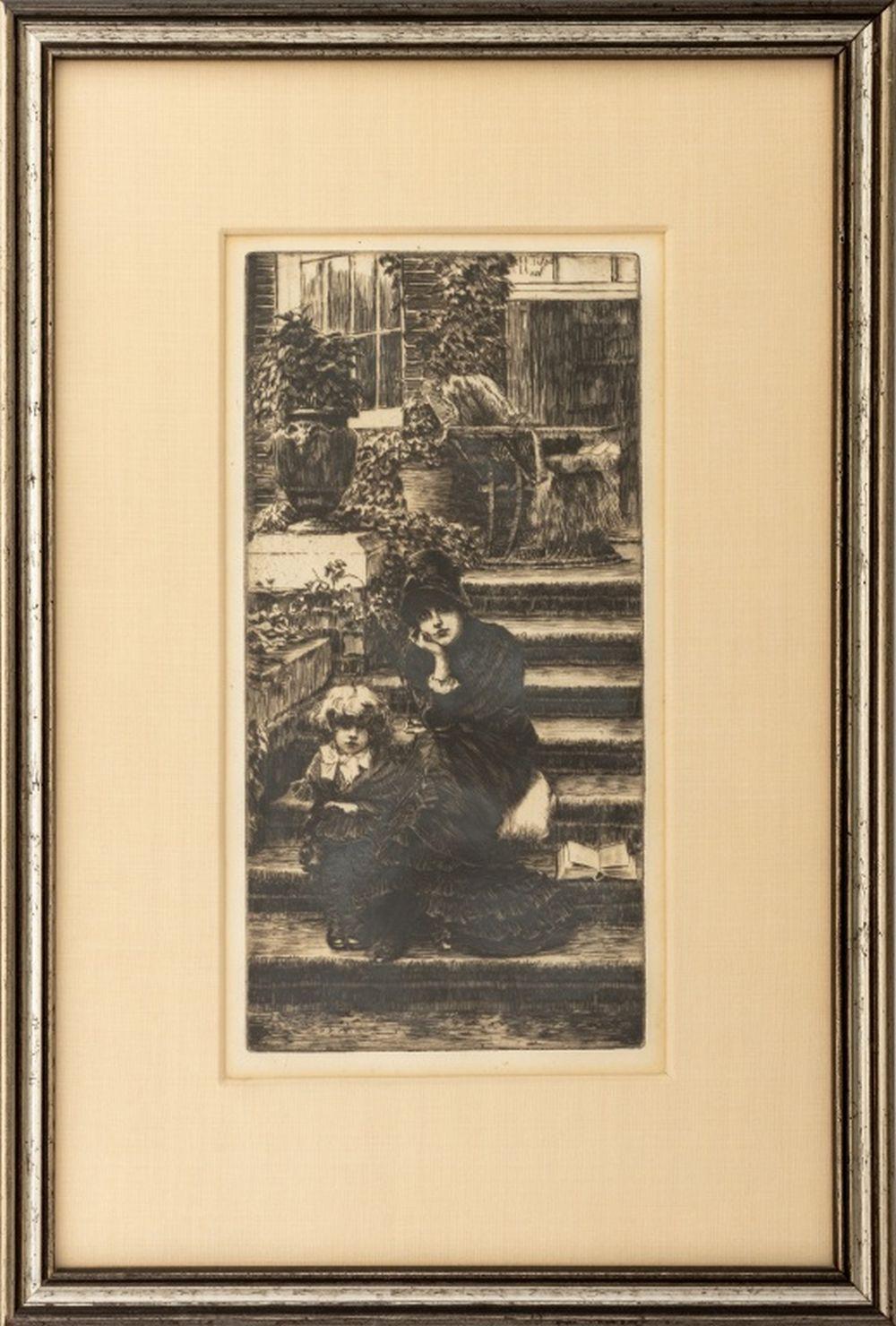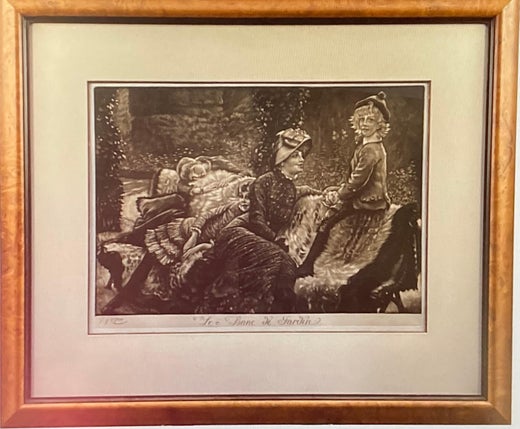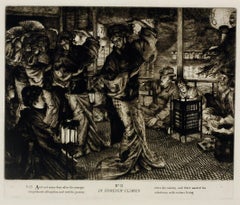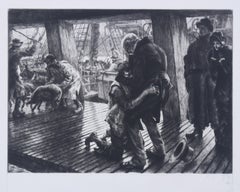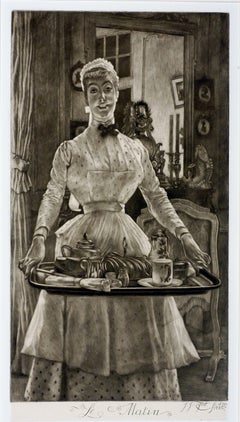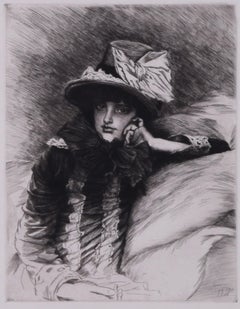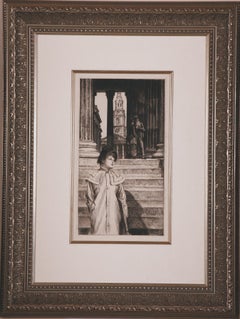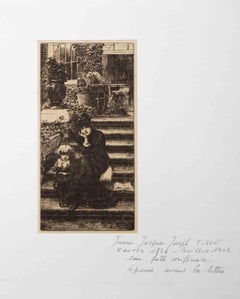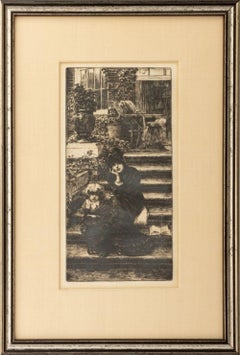Items Similar to L'enfant prodigue: en pays etranger (The Prodigal Son: In Foreign Climes)
Want more images or videos?
Request additional images or videos from the seller
1 of 10
James Jacques Joseph TissotL'enfant prodigue: en pays etranger (The Prodigal Son: In Foreign Climes)1881
1881
$2,000
£1,512.48
€1,732.46
CA$2,802.48
A$3,059.37
CHF 1,610.79
MX$36,647.65
NOK 20,601.46
SEK 18,809.48
DKK 12,941.86
About the Item
L'enfant prodigue: en pays etranger (The Prodigal Son: In Foreign Climes)
Etching, 1881
Unsigned (as usual for this state)
From: L'enfant prodigue, (The Prodigal Son, five plates)
Edition: 400 in this state
Total edition: 500
Plate size: 12-1/4 x 14-3/4"
Sheet size: 19 5/8 x 24 1/2 "
Condition: Excellent, usual aging for 100 year old paper
Provenance: Heirs of Edmund Sagot, Paris
Reference: Wentworth 59 ii/II, with the title and caption
Tissot was the recent subject of a major retrospective organized by the Musee D'Orsay, Paris and the Fine Arts Museum of San Francisco. The following is excerpted from their press release:
"James Tissot (1836–1902) was one of the most celebrated French artists during the 19th century, yet he is less known than many of his contemporaries today. Presenting new scholarship on the artist’s oeuvre, technique, and remarkable life, James Tissot: Fashion & Faith provides a critical reassessment of Tissot through a 21st-century lens. The exhibition, co-organized by the Fine Arts Museums of San Francisco and the Musées d’Orsay et de l’Orangerie, Paris, includes approximately 60 paintings in addition to drawings, prints, photographs, and cloisonné enamels, demonstrating the breadth of the artist’s skills. The presentation at the Legion of Honor is the first major international exhibition on Tissot in two decades and the first ever on the West Coast of the United States.
“The work of James Tissot provides a fascinating lens onto society at the dawn of the modern era. Long recognized as a keen observer of contemporary life and fashion, this exhibition brings new light to his narrative strengths and his skill in portraying the emotional and spiritual undercurrents that exist below surface appearances,” states Thomas P. Campbell, Director and CEO of the Fine Arts Museums of San Francisco. “Continuing the Fine Arts Museums’ tradition of contributing original scholarship around key works in our collection, we are thrilled to introduce the perspective of this enigmatic, prolific artist in the first exhibition of his work to take place on the West Coast.”
Tissot’s works have been highly sought after for US collections, and, as such, James Tissot: Fashion & Faith draws from the rich holdings of the Fine Arts Museums of San Francisco; the J. Paul Getty Museum, Los Angeles; the National Gallery of Art, Washington, DC; and numerous private collections, in addition to private and public collections throughout Europe and Canada, including those of Tate, London; the Musées d’Orsay et de l’Orangerie; the Petit Palais, Musée des Beaux-Arts de la Ville de Paris; the Musée d’Arts de Nantes; the National Gallery of Canada, Ottawa; and the Musée des Beaux-Arts de Montréal. In addition, new findings on Tissot’s materials and painting technique—resulting from an extensive, unprecedented study of Tissot paintings and led by the paintings conservation department at the Fine Arts Museums—are revealed in the exhibition. The study was undertaken in collaboration with the Northwestern University/ Art Institute of Chicago Center for Scientific Studies in the Arts (NU-ACCESS) and the Centre for Research and Restoration of the Museums of France.
Arranged chrono-thematically, James Tissot: Fashion & Faithwill trace the extraordinary turns of the artist’s life, as he consistently defied traditional conventions, both professionally and personally. A Frenchman who started out painting medievalized scenes from history and literature, Tissot maintained a complicated friendship with mentee Edgar Degas, went on to adopt an Anglicized version of his name; Jacques, and spent a decade as an expatriate in London, immersing himself in and chronicling modern society. For a time, he ventured into a love affair with the young divorcée Kathleen Newton, who became his model and muse, but, after her tragic premature death, he returned to Paris and spent long periods of productive retreat at his family estate in the French countryside, nurturing a growing, deep commitment to religion.
Tissot’s career spanned the English Channel, garnering commercial and critical success both in London and Paris. Though invited by Degas to exhibit with the Impressionists, Tissot declined. He turned to social events and balls, painting metropolitan life with great attention to detail, humor, and pathos. Upon close study, even his most ebullient society pictures reveal rich and complex commentary on Belle Époque culture, religion, fashion, and politics. The exhibition will include many key modern-life works from his time in London and Paris, such as The Ball on Shipboard (1874), London Visitors (ca. 1874), Holyday (also known as The Picnic; 1876), The Prodigal Son in Modern Life suite (1882), and examples from the La Femme à Paris series (1883–1885).
“James Tissot was technically gifted across a variety of media and he experimented with major trends in art, including Aestheticism and Japonisme, yet his work defies classification and traditional labels,” notes Melissa Buron, exhibition curator and Director of the Art Division at the Fine Arts Museums of San Francisco. “For the past few years, my colleagues and I have been on the trail of Tissot, re-examining works and uncovering previously unpublished information that provides insight into his career, including his sales notebook (carnet de ventes) and hundreds of photographs. Drawing from our findings, James Tissot: Fashion & Faith provides new perspectives on where and how Tissot should be considered in the 19th-century canon.”
As was popular during the late 19th century, Tissot dabbled in mysticism and attended Spiritualist séances. His famous mezzotint from the Fine Arts Museums’ collection, The Apparition (1885), depicts the ghost of Kathleen Newton with a spirit guide as they reportedly appeared to Tissot during a séance. This work and the painting on which it is based—long thought to be lost or destroyed until it was rediscovered in the course of researching this project—are both on view in the exhibition.
Though less is known about the last two decades of Tissot’s life, new scholarship has recently shed light on the final 20 years of his career. During that time, he made three trips to the Holy Land and produced hundreds of watercolors to illustrate the Bible. Wildly popular during Tissot’s lifetime, these religious images became known as the “Tissot Bible” and have since influenced filmmakers from D. W. Griffith (Intolerance, 1916) to William Wyler (Ben-Hur, 1959), as well as Steven Spielberg and George Lucas (Raiders of the Lost Ark, 1981). A selection of biblical watercolors have been lent to the exhibition from the Brooklyn Museum and the Jewish Museum, New York.
Tissot also utilized the relatively new medium of photography by painting from photographs and recording many of his works as well as his home, family, and friends in carefully arranged albums. Photographs from the Fine Arts Museums’ collection in the exhibition, along with recently discovered, never-before-published photographs and a sales notebook published for the first time in the exhibition catalogue, provide a window into Tissot’s life and career, rendering him an artist worthy of reexamination in the 21st century."
- Creator:James Jacques Joseph Tissot (1836-1902, French)
- Creation Year:1881
- Dimensions:Height: 12.25 in (31.12 cm)Width: 14.75 in (37.47 cm)
- Medium:
- Movement & Style:
- Period:
- Condition:
- Gallery Location:Fairlawn, OH
- Reference Number:Seller: FA66891stDibs: LU14015914422
James Jacques Joseph Tissot
Jacques Joseph Tissot (French: [tiso]; 15 October 1836 – 8 August 1902), Anglicized as James Tissot (), was a French painter and illustrator. He was a successful painter of Paris society before moving to London in 1871. He became famous as a genre painter of fashionably dressed women shown in various scenes of everyday life. He also painted scenes and figures from the Bible.
About the Seller
5.0
Recognized Seller
These prestigious sellers are industry leaders and represent the highest echelon for item quality and design.
Gold Seller
Premium sellers maintaining a 4.3+ rating and 24-hour response times
Established in 1978
1stDibs seller since 2013
835 sales on 1stDibs
Typical response time: <1 hour
Associations
International Fine Print Dealers Association
- ShippingRetrieving quote...Shipping from: Fairlawn, OH
- Return Policy
More From This Seller
View AllL'enfant prodigue: en pays etranger (The Prodigal Son: In Foreign Climes)
By James Jacques Joseph Tissot
Located in Fairlawn, OH
L'enfant prodigue: en pays etranger (The Prodigal Son: In Foreign Climes)
Etching, 1881
Unsigned (as usual for this state)
From: L'enfant prodigue, (The Prodigal Son, five plates)
Ed...
Category
1880s Impressionist Figurative Prints
Materials
Etching
The Parable of the Prodigal Son, Mo. III, The Return
By James Jacques Joseph Tissot
Located in Fairlawn, OH
The Parable of the Prodigal Son, Mo. III, The Return
Etching, 1881
Signed and dated in the plate (see photo)
From: The Prodigal Son (four plates and title plate)
This being an impre...
Category
1880s Impressionist Figurative Prints
Materials
Etching
Le Matin (Morning)
By James Jacques Joseph Tissot
Located in Fairlawn, OH
Le Matin (Morning)
Mezzotint, 1886
Signed and dated in the plate (see photos)
Edition: at least 650 impressions in both states
Reference: Wentworth 82 ii/II
Provenance: Heirs of Edmu...
Category
1880s French School Interior Prints
Materials
Mezzotint
Berthe
By James Jacques Joseph Tissot
Located in Fairlawn, OH
Berthe
Etching with drypoint, 1883
Signed in the plate (see photo)
This etching was inspired by an 1882/3 pastel which the artist included in his ambitious "Femme a Paris" exhibition at Galerie Sedelmeyer, Paris, in 1885.
Reference: Beraldi 65
Wentworth 74, published state
Tissot 76
Condition: Excellent
Plate/Image size: 14 1/4 x 11 inches
Sheet size: 19 1/2 x 15 inches
Frame size: 23-1/2 x 20-1/4 inches
Donald Morris Gallery, Birmingham, Michigan (Morris had a distinguished collection of Tissot prints...
Category
1880s Impressionist Portrait Prints
Materials
Etching
Le banc de jardin (The Garden Bench)
By James Jacques Joseph Tissot
Located in Fairlawn, OH
Le banc de jardin (The Garden Bench)
Mezzotint and engraving on cream chine collé laid down on ivory wove paper, 1883
Signed in the plate (see photo)
Condition: Brilliant impression...
Category
1880s Impressionist Figurative Prints
Materials
Mezzotint
Au bord de la mer (At the Sea Side)
By James Jacques Joseph Tissot
Located in Fairlawn, OH
Au bord de la mer (At the Sea Side)
Etching and drypoint, 1880
Signed in the plate middle left edge (see photo)
Edition: c. 100
A very rich impression, full of burr and contrasts
Pri...
Category
1880s Impressionist Figurative Prints
Materials
Etching
You May Also Like
Le Portique de la Galerie Nationale a Londres by J.J. Tissot
By James Jacques Joseph Tissot
Located in Hinsdale, IL
J.J. Tissot
Le Portique de la Galerie Nationale a Londres
(The Portico of the National Gallery, London)
Wentworth 40
Etching and Drypoint on imitation Japanese paper, C. 1878
Only st...
Category
1890s Realist Prints and Multiples
Materials
Drypoint, Etching
$4,400 Sale Price
20% Off
"Le Portique de la Galerie Nationale a Londres" etching by Tissot
By James Jacques Joseph Tissot
Located in Hinsdale, IL
TISSOT, JAMES JACQUES JOSEPH
(1836 - 1902)
"Le Portique de la Galerie Nationale a Londres"
(The Portico of the National Gallery, London)
Wentworth 40
Etching and Drypoint on imitation Japanese paper, C. 1878
Only state published, from the edition of 100
Signed 1878 J.J. Tissot on the step, lower right
14 7/8” x 8 1/4”
Excellent crisp impression
This etching is related to the painting London Visitors exhibited at the Royal Academy in 1874, no. 116. The setting is the portico of the National Gallery, looking toward the Church of St. Martin’s-in-the-Fields. Such works give Tissot a minor but distinguished position as a predecessor of the school of architectural etchers...
Category
Late 19th Century Impressionist Figurative Prints
Materials
Etching
Girl and Child - Etching by James Tissot - Late 19th Century
By James Tissot
Located in Roma, IT
Girl and Child is an original Modern artwork realized by James Tissot, in full James-Joseph-Jacques Tissot, (born Oct. 15, 1836, Nantes, France—died Aug. 8, 1902, Buillon Abbey, near...
Category
Late 19th Century Modern Portrait Prints
Materials
Paper, Etching
"Reverie"
By James Jacques Joseph Tissot
Located in Astoria, NY
James Jacques Joseph Tissot (French, 1839-1906), "Reverie", Etching and Drypoint on Laid Paper, 1889, silvered wood frame. Image: 9" H x 4.5" W; frame: 14.75" H x 10" W. Provenance: ...
Category
1880s Figurative Prints
Materials
Laid Paper, Drypoint, Etching
Renée Mauperin; Ten Etchings, Complete Set for novel by Goncourt Brothers
By James Jacques Joseph Tissot
Located in Middletown, NY
Renée Mauperin; Ten Etchings, Complete Set for the Illustrations to the Novel by Edmond and Jules de Goncourt 1882
Paris: G. Charpentier et Cie, 1882-1884.
The complete set of ten ...
Category
Late 19th Century Realist Interior Prints
Materials
Etching
original etching
By James Jacques Joseph Tissot
Located in Henderson, NV
Medium: original etching. Executed by Tissot for the "Rene Mauperin" suite of etchings, published in Paris in 1884 by Charpentier in a limited edition of 550. This is a nice impressi...
Category
1880s Prints and Multiples
Materials
Etching
More Ways To Browse
Antique Canon
Antique Canons
Antique Shed
Antique Ark
Antique Illustrated Bible
James L Thomas
Skate Decks Keith Haring
Sophy Brown
Southwest Vintage Posters
Sticky Fingers Album
Sunset Peter Max
Tammy Wynette
Tarkay Lithograph
Tessa Beaver
The Physiognomy Ear
Van Strydonck
Venus In Furs
Vintage Continental Airlines Poster
